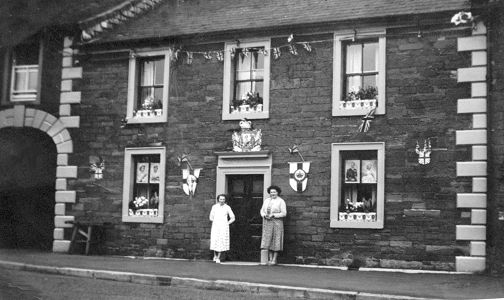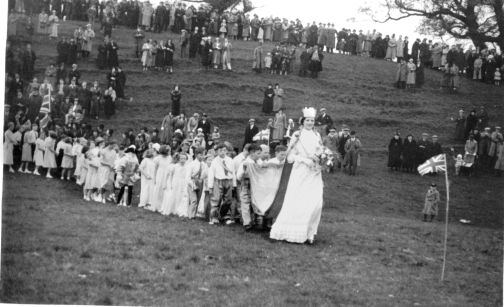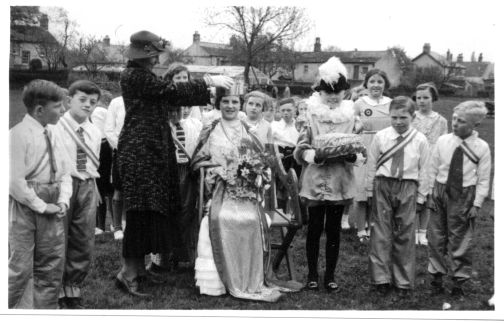Dalston Coronation Day Celebrations
Written in 1937 by Jack Hickson at age of 13 years
Dalston Coronation celebrations held this year on May 12th (1937) were looked eagerly forward to by all the inhabitants of the village and neighbourhood who had decorated their houses with all manner of red, white and blue decorations.

At last the great day dawned and although the procession from the Grammar School to the the old church of St Michaels did not start until 1.45, children and parents alike all visibly excited were there in Sunday best clothes well before time. It is 1.45 at last and the procession led by the children from the National and Royal School moves slowly down the road. Behind the school children come the boy scouts, followed by the wolf cubs, guides and the May Queen and her attendants.
After a short service in the
church the national anthem is sung in the Square, because everyone could not
get in the church and the music is played by a Carlisle boy’s band. Following
this the procession moves through the crowd, past the decorated houses around
the square and by the post office where in front of Glave Hill it halts. Here
after a short speech made by Mr Trimble of Green Lane, a young chestnut tree is
planted by Mrs Trimble and Lady Morton. Once more to the music of the band the
procession moves up the New road where at the White Bridge a silver birch tree
is planted by Lady Morton. Once more it moves on this time over the Green and
down Green Row. It enters the showfield where it breaks up, most of the people going
onto the bank to watch the proceedings. The May Queen (Margaret Tinson nee Carruthers) leaves her car and
followed by her hosts of attendants and dancers walks slowly up to her chair on
which she seats herself.

She is crowned by Mrs Hawkins of the vicarage and the Rev. R.H. Hawkins proclaims her first May Queen of Dalston.

The mace bearer next walks slowly between the two rows of country dancers who have formed in two lines in front of the Queen. On reaching her and in a very dignified manner he hands the mace to her.After this to the tune of a gramophone, the dancers dressed in navy blue shorts, white sandals and white shirts start their performance.
Next in the Victory Hall everyone enjoys a hearty tea of chocolate biscuits, brown bread, sandwiches and fancy cakes. Immediately the tea is over the children all eager to win a prize, rush into the Showfield once more for the sports begin at once. Following the flat races for boys and girls, the high jump, obstacle race and various other events comes the six a side football competition, a very exciting event. The tug of war turns out to be very exciting, the team led by the Rev. J.S. Aynsley winning. Crowded around the pole suspended across posts driven into the ground are the onlookers of the pillow fight. The biffs of the pillows can be heard and the occasional roar of laughter as one of the combatants falls off the pole.
At ten o’ clock everyone gathers around the bonfire to see it lighted by the scouts who built it. Petrol is poured over it and lighted paper thrown on by the scouts who are standing well away. With a muffled explosion the petrol catches alight, the flames spreading quickly through the sticks and gorse bushes. Gradually the crowd surrounding the fire back away because the heat given out is terrific. The flames cast a vivid glow in the sky and the crackling sticks send numerous sparks into the air. The vast clouds of billowing smoke rise skywards where rockets leaving their trails of yellow sparks flash and bang. The fire gradually dies down and the crowd either retire to their homes or to the dance in the Victory Hall where the blaring of the band can be heard and everyone heartily agrees that it had been SOME DAY.